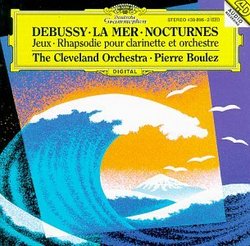| All Artists: Claude Debussy, Pierre Boulez, The Cleveland Orchestra Title: Debussy: La Mer / Nocturnes / Jeux / Rhapsodie pour clarinette et orchestre - The Cleveland Orchestra / Pierre Boulez Members Wishing: 0 Total Copies: 1 Label: Deutsche Grammophon Release Date: 3/21/1995 Genre: Classical Styles: Ballets & Dances, Ballets, Chamber Music, Historical Periods, Modern, 20th, & 21st Century, Romantic (c.1820-1910), Instruments, Reeds & Winds Number of Discs: 1 SwapaCD Credits: 1 UPC: 028943989626 |
Search - Claude Debussy, Pierre Boulez, The Cleveland Orchestra :: Debussy: La Mer / Nocturnes / Jeux / Rhapsodie pour clarinette et orchestre - The Cleveland Orchestra / Pierre Boulez
 | Claude Debussy, Pierre Boulez, The Cleveland Orchestra Debussy: La Mer / Nocturnes / Jeux / Rhapsodie pour clarinette et orchestre - The Cleveland Orchestra / Pierre Boulez Genre: Classical
Pierre Boulez made his early reputation as a Debussy conductor, and with good reason. Debussy's reputation as a musical "impressionist" led most people to think of him as a sort of musical Claude Monet--all blurry outli... more » ![header=[] body=[This CD is available to be requested as disc only.]](/images/attributes/disc.png?v=15401716) ![header=[] body=[This CD is available to be requested with the disc and back insert.]](/images/attributes/disc_back.png?v=15401716) ![header=[] body=[This CD is available to be requested with the disc and front insert.]](/images/attributes/disc_front.png?v=15401716) ![header=[] body=[This CD is available to be requested with the disc, front and back inserts.]](/images/attributes/disc_front_back.png?v=15401716) |
Larger Image |
CD DetailsSynopsis
Amazon.com essential recording Pierre Boulez made his early reputation as a Debussy conductor, and with good reason. Debussy's reputation as a musical "impressionist" led most people to think of him as a sort of musical Claude Monet--all blurry outlines and fuzzy images--but Boulez changed this perception, bringing an analytical clarity and razor-sharp definition to the composer's musical mosaics. What he has achieved in this second series of Debussy recordings is an additional naturalness and spontaneity of expression. The Cleveland Orchestra is the ideal vehicle for this sort of interpretation, being perhaps the most technically precise band in the world. The result is just about perfect. -- David Hurwitz Similarly Requested CDs
|
CD ReviewsUtterly exquisite renditions chefdevergue | Spokane, WA United States | 02/17/2004 (5 out of 5 stars) "Even though Boulez is renowned for bringing discipline to his orchestras, I still never cease to marvel at how he pulled off these simply seamless, splendid performances. Discipline is of the utmost importance with Debussy: a brass sections that doesn't have its dynamics perfectly under control can destroy "La Mer" in any number of places. The same can be said of the female chorus in "Nocturnes: Sirenes." We have all heard the wobbly, out-of-control chorus in Sirenes, that demolishes all of the splendid orhcestral work that preceded it.On the other hand, discipline can go overboard and turn into a rigid mechanical performance, and nobody needs to hear an orchestra going through the motions, hitting every note perfectly, but rendering a performance bereft of any passion whatsoever. The trick is to walk the line perfectly between being disciplined and being mechanical, and Boulez has indeed pulled this off.It is just wonderful to hear a smoothly modulated brass section playing its part with the right level of nuance, and a woodwind section dealing with Debussy's challenging rhythms with ease and comfort. The string section also play their parts perfectly.I also must tip my hat to Franklin Cohen for his performance in as fine a Rhapsodie as I have ever heard.Overall, this is an endlessly pleasing Debussy disc. The casual listener can simply enjoy Debussy's music on its own merits, while the more serious listener can enjoy diving into the intricacies of Debussy's score, appreciating the splendid job that Boulez & the Cleveland Orchestra has done." Boulez and Cleveland in another stunning collaboration Bruce Hodges | New York, NY | 06/19/2002 (5 out of 5 stars) "Let's face it: there are many fine Debussy recordings on the market, and "Jeux" and "La Mer" have been recorded often. I especially like Dutoit's recording with the Montreal orchestra, and Haitink's with the Concertgebouw from the 1970's (which as part of a two-disc set is also quite a bargain). But if you are looking for a version in clear, modern sound, this might be the one. Boulez is just about perfect for this music, with his emphasis on clarity, coupled with a somewhat unsentimental approach. Deutsche Grammophon's recording is outstanding. Even in the loudest passages of "La Mer" for example, every instrumental strand can still be heard. The Cleveland Orchestra is, well, the Cleveland Orchestra - an incomparable group that is worth sampling any time, in any repertoire. Their playing here appears so effortless - which of course it isn't - and that illusion only heightens the mood created by the relaxed brilliance of Debussy's writing.A great recording, for fans of Boulez, the orchestra, and of course these magnificent, glittering Debussy scores." Beauty and drama NotATameLion | Michigan | 06/05/2000 (4 out of 5 stars) "Pierre Boulez must be numbered among the greatest conductors of the twentieth century. In these recordings he does a magnificent job. In four stylistically different pieces by Claude Debussy, he draws beauty and drama from sometimes conflicted music. Boulez has just the right gentle touch in his conducting to make the Nocturnes soothingly lyric without being too mellow. The premiere Rhapsodie is a wonderful intrigue. Franklin Cohen plays the clarinet lead of this piece with style. The Jeux is delightfully entertaining. I especially like the Cleveland brass on this piece. Weaving in and out of the background of the strings, it paints some great musical images. La Mer is for me the high point of the disc. Its representation of the power of the sea is stunning. Tossed to and fro between tunes, never clinging to one too long, it becomes a masterpiece in the able hands of Boulez. At 70.58, there is not an uninteresting moment on this recording. Boulez shows here why he is the master of this repertoire. I recommend this disc."
|

 Track Listings (8) - Disc #1
Track Listings (8) - Disc #1








